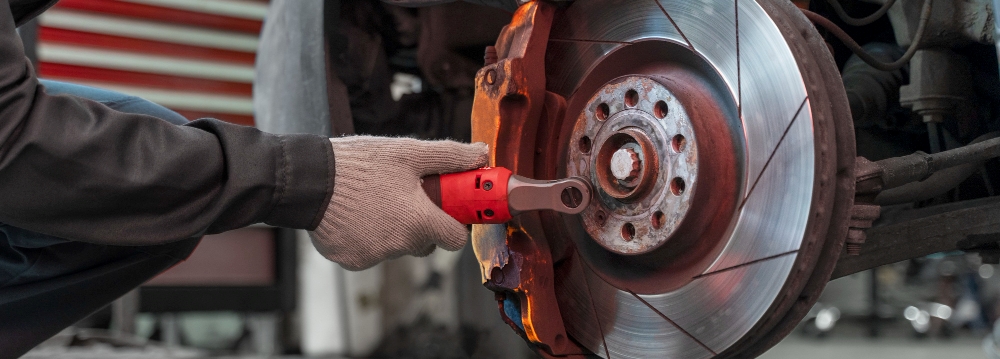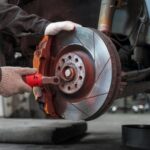
14 Aug Why Does Brake Fade Occur? Learn Tips To Help Prevent It
 Have you ever experienced a weird situation where your car suddenly won’t slow down or stop? It feels like your brakes are completely useless, and it scared the bejeezus out of you? Maybe it was when you were towing your trailer to the campground up in the mountains. Or when driving home for hours in bumper-to-bumper traffic. But after a while, the brakes worked again perfectly – like nothing was wrong. You’re not going crazy. If your brakes don’t work intermittently, you don’t need emergency auto repairs; it’s just that your brake pads or brake fluid are too hot, causing brake fade. Let me explain.
Have you ever experienced a weird situation where your car suddenly won’t slow down or stop? It feels like your brakes are completely useless, and it scared the bejeezus out of you? Maybe it was when you were towing your trailer to the campground up in the mountains. Or when driving home for hours in bumper-to-bumper traffic. But after a while, the brakes worked again perfectly – like nothing was wrong. You’re not going crazy. If your brakes don’t work intermittently, you don’t need emergency auto repairs; it’s just that your brake pads or brake fluid are too hot, causing brake fade. Let me explain.
What Is Brake Fade?
Brake fade is an unexpected reduction in braking effectiveness. Have you ever been in stop-and-go traffic for a while and noticed your brake pedal feels spongy? Or you’re driving down a long hill and it takes longer (or requires more effort) to stop your car? Congratulations! You have experienced brake fade.
Types Of Brake Fade
So, what causes brake fade? There are a few reasons brake fade occurs, but it can be frustrating to diagnose since it only happens under specific conditions. Let’s review them now.
Pad Fade
The most common cause of brake fade is due to overheated brake pads. Brake fade occurs when the friction of braking generates more heat than it can dissipate. Under ideal circumstances, active braking maintains the brake pads’ temperature below 400 degrees Fahrenheit. However, prolonged brake system usage can cause brake pad temperatures to exceed 700 degrees Fahrenheit. When operating at such high temperatures, brake fade occurs more frequently.
Fluid Fade
Brake fluid comes in several different types and formulas. DOT 3 and DOT 4 are often used in passenger vehicles and have a ‘dry’ boiling point of 401 degrees F (DOT3) and 446 degrees F (DOT4). However, brake fluid is hygroscopic, so it absorbs water vapor over time. Once brake fluid absorbs enough moisture to reach a 3.7% water content, it boils at a much lower temperature. This lower temperature is the ‘wet’ boiling point. During heavy braking usage, your vehicle can reach or exceed the wet boiling point. Boiling brake fluid creates bubbles in the brake lines. These bubbles compress much more easily, resulting in a spongy-feeling brake pedal and brake fade.
Green Fade (Gas Fade)
Green fade is less common these days due to higher quality materials and stricter manufacturing criteria. Simply put, gases get trapped in the brake pad material during manufacturing. These gases escape when the brake pads heat up and create a buffer between the surface of the pad and the brake rotor, which reduces friction. When green fade occurs, it feels like your vehicle won’t stop, no matter how hard you press the brake pedal.
Here’s How To Prevent Brake Fade
The best way to prevent brake fade is to practice routine auto maintenance. Follow your vehicle’s factory-recommended service intervals and schedule auto repairs as soon as you notice a change in vehicle safety or performance. Let’s break it down into some more useful actions.
Replace Worn Brake Pads (or Shoes)
This may seem pretty obvious, but replacing old, damaged, and worn brake pads is really important to maintain your vehicle’s safety. Your car cannot slow down or stop efficiently without the necessary components. Remember, brake pads and brake shoes are consumable parts. Meaning, they wear out with use and require periodic replacement. If you choose to keep worn brake pads installed past their useful lifespan, you risk causing damage to your rotors, calipers, and other braking system parts.
Test Brake Fluid & Replace When Needed
Depending on your vehicle, the auto manufacturer’s suggestions on brake fluid service can vary. Commonly used brake fluids can absorb up to 2% moisture content per year. High humidity and rainy weather can accelerate this process. That means that your brake fluid can reach the 3.7% wet boiling point threshold in less than 2 years. It’s a good practice to have your service technician test your brake fluid for viability once a year. If you notice a decline in brake performance, schedule a diagnostic service right away.
Driving Style
When we learn to drive, we often develop our driving style by mimicking the person who taught us. Over time, our vehicle type, environment, and personality can change the way we drive. Even factors like climate, hunger, and stress can alter our driving behaviors. Impatient drivers often accelerate and brake quickly and aggressively. Bad habits can also include tailgating, riding the brakes, and waiting until the last minute to brake hard. When you overuse your vehicle’s brakes, they heat up. If they are not allowed to cool back down, the likelihood of brake fade occurring rises substantially.
It’s safer and more efficient to practice patient driving habits:
- Maintain a wide gap between your car and the one in front of you.
- Stick to the posted speed limit.
- Give yourself plenty of room to slow down and stop safely.
- Never drive with your foot resting on the brake pedal.
Brake Maintenance & Auto Repairs
At Plymouth Auto & Tire Center, our technical staff has accrued over 40 years of ASE-certified training. We know how important it is to have your car in perfect working order, so we strive to provide same-day service. Our staff is happy to discuss how new brake pads or fresh brake fluid can help prevent brake fade. If your vehicle requires basic brake maintenance or more significant auto repairs, we are here to help!
Schedule A Brake Fade Service in Plymouth Meeting, PA
Give us a call at (610) 825-6558 or visit us online to schedule an appointment for your next brake service.
Coupons & Discounts
Auto repairs & service coupons at Plymouth Auto & Tire Center for Montgomery County, Pennsylvania, including:
- Plymouth Meeting
- Whitemarsh
- Conshohocken
- Blue Bell
- Lafayette Hill
- Norristown
- other surrounding communities.

